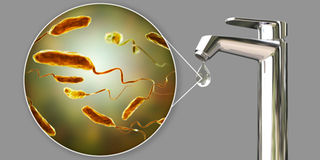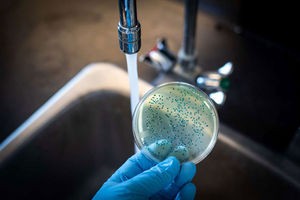Everything you need to know about cholera

Health officials are on high alert following a cholera outbreak.
What you need to know:
- For those who get severe cholera disease, the main symptom is profuse watery diarrhoea that looks like water in which rice has just been washed – rice water diarrhoea. Nausea and vomiting may also be present.
Dear doctor,
There is a cholera outbreak in the area where I live. It seems to be a very dangerous disease. How can you know if you have it so that you can get treated early? Simon
Dear Simon,
Cholera is an intestinal infection caused by bacteria called Vibrio Cholerae. The bacteria are spread through contaminated water, and from taking raw or undercooked seafood. In addition, vegetables and fruits that are grown with contaminated sewage can be a source of cholera, especially when eaten raw and/or unpeeled. Food can also get contaminated after cooking if it stays for long at room temperature before it is eaten.
Most people who are exposed to the bacteria do not get any symptoms, or they get mild/moderate disease, which cannot be easily differentiated from other causes of diarrhoea. However, anyone who is infected with the bacteria, even if they do not get any symptoms, they still shed the bacteria in their stool for seven to 14 days and can therefore still spread the infection.
For those who get severe cholera disease, the main symptom is profuse watery diarrhoea that looks like water in which rice has just been washed – rice water diarrhoea. Nausea and vomiting may also be present. Due to the profuse diarrhoea, the affected person can develop dehydration very quickly. Even a previously healthy person can have severe dehydration within hours. Severe dehydration can lead to low blood pressure and acute kidney damage. Severe low blood sugar can also develop, and the severe fluid loss also causes electrolyte imbalance and muscle cramps. If the severe dehydration is not treated, hypovolemic shock develops, which can cause death in minutes.
Anyone who is exposed to cholera can develop the disease, but there is a higher risk for persons who have lower levels of stomach acids such as young children, older persons, and people who are taking medications to lower stomach acids.
Cholera diagnosis is confirmed through a stool test. The main treatment in cholera disease is rehydration to replace the lost fluids and electrolytes. This may be through taking oral rehydration solution (ORS) that is mixed in safe water, or using intravenous fluids for those with severe dehydration. ORS is readily available in health facilities, but before you can get access to the ORS, start by taking plain water and/or other fluids available at home. Antibiotics may also be prescribed. Zinc supplements may be helpful for children with diarrhoea.
To prevent cholera, practice hand hygiene by washing hands with soap and water or by using hand sanitiser. Use safe water for drinking, cooking, washing fruits and brushing teeth. Eat food that is properly cooked and served hot. Only eat fruits and vegetables that you can peel yourself, and avoid salads and fruits that cannot be peeled. There is also a cholera vaccine available.
Dear doctor,
I have been having tummy issues for a while now. I have undergone many tests that always come back negative and recently I was told I have irritable bowel syndrome. How is this diagnosed? Is it curable? Kim
Dear Kim,
Irritable bowel syndrome is one of the functional bowel/gastrointestinal disorders. These are disorders where there is a problem with the working of the gastrointestinal system, but there is no identifiable cause for it – no structural problems, no infections, and no biochemical causes.
Irritable bowel syndrome (IBS) refers to a group of bowel symptoms that happen together, and there is no identified underlying cause. The most common symptoms are abdominal pain or cramping, usually happening when you need to pass stool; having excess gas or bloating; diarrhea, or constipation, or both; feeling like you have not emptied your bowels completely after passing stool; and having mucus in stool. The symptoms tend to come and go, and there may be triggers that may cause flare-ups such as stress, some foods, and hormonal changes.
IBS is categorised as a disorder of gut-brain interactions, meaning that there is a change in how the brain communicates with the gastro-intestinal system. This can cause problems with how the intestinal muscles contract and relax to move food through the system. In IBS, the muscles of the large intestines contract more, which causes cramping and pain. The problems with gut-brain communication can also lead to hypersensitivity – the nerves within the digestive tract may be more sensitive to pain and discomfort. Other factors that may contribute to IBS include changes in the gut bacteria; having food intolerances; experiencing severe stress in childhood; or following severe intestinal infections. Women are more likely than men to be diagnosed with IBS. There is also an increased risk of IBS in persons with depression, anxiety disorders, and pain disorders like fibromyalgia and chronic pelvic pain.
IBS is diagnosed if there have been symptoms at least one day per week for the past eight to 12 weeks, there is no identified underlying cause after evaluation, and the symptoms either interfere with activities of daily life, or they are a source of worry, or they interfere with the quality of life.
There is no cure for IBS, but the symptoms can be managed. Dietary changes that may be helpful include increasing fibre in your diet; reducing intake of dairy products and gluten; reducing intake of foods that make you gassy; and taking a lot of water. You can keep a food diary to help you identify which foods worsen the symptoms so that you can limit them. In addition, getting regular exercise, having adequate sleep and learning to relax and manage stress can also be helpful. Support from a mental health professional may be helpful with managing stress, and any other psychological concerns. There are medications that can be given to help relieve symptoms and prevent flare-ups, and medication to manage depression and anxiety, if necessary.
While IBS does not have a cure, it is manageable, and it also does not put you at a higher risk of getting more serious gastrointestinal conditions or cancer.
Send your questions to healthynation@ke.nationmedia.com

